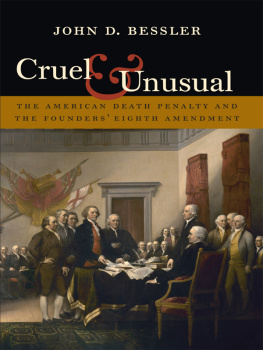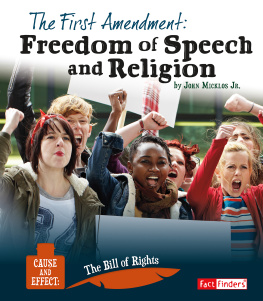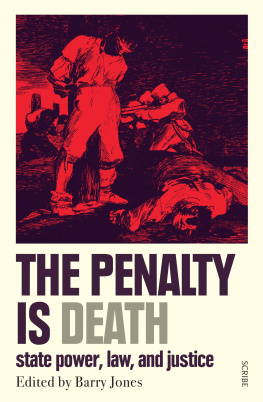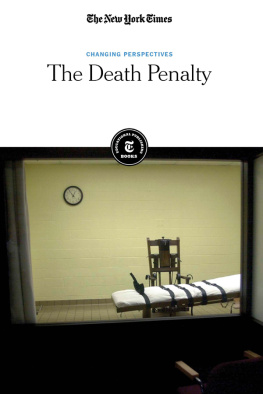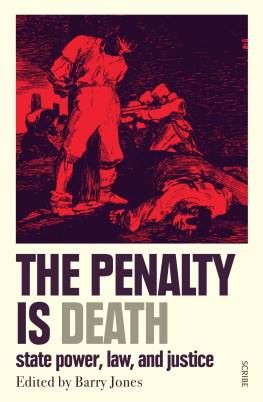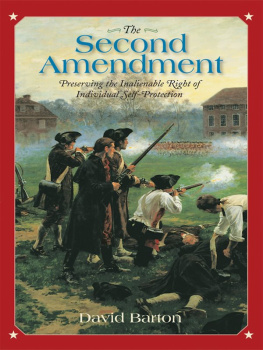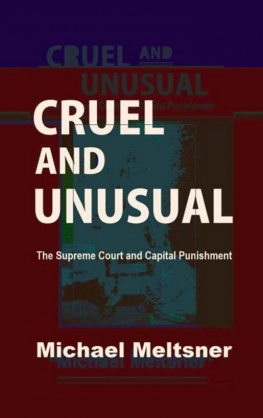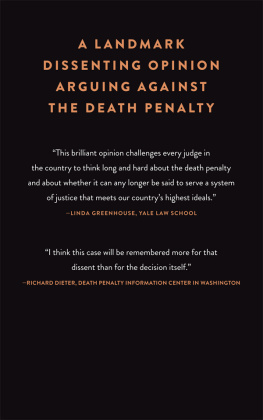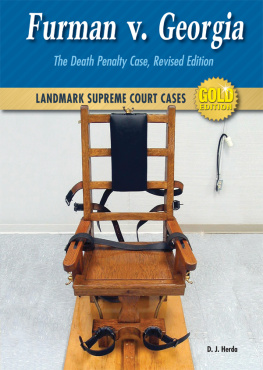Also by John D. Bessler
Death in the Dark: Midnight Executions in America
Kiss of Death: Americas Love Affair with the Death Penalty
Legacy of Violence: Lynch Mobs and Executions in Minnesota
Writing for Life: The Craft of Writing for Everyday Living
Cruel
&
Unusual
THE AMERICAN DEATH PENALTY AND THE
FOUNDERS EIGHTH AMENDMENT
JOHN D. BESSLER
Northeastern University Press
BOSTON
NORTHEASTERN UNIVERSITY PRESS
An imprint of University Press of New England
www.upne.com
2012 Northeastern University
All rights reserved
For permission to reproduce any of the material in this book, contact Permissions, University Press of New England, One Court Street, Suite 250, Lebanon NH 03766; or visit www.upne.com
Library of Congress Cataloging-in-Publication Data
Bessler, John D.
Cruel and unusual : the American death penalty and the
founders Eighth Amendment / John D. Bessler.
p. cm.
Includes bibliographical references and index.
ISBN 978-1-55553-716-6 (cloth : alk. paper)
ISBN 978-1-55553-717-3 (ebook)
1. Capital punishmentUnited States. I. Title.
KF9227.C2B478 2011
345.730773dc23 2011034380
In memory of
Cesare Beccaria
and
Dr. Benjamin Rush

I am certainly not an advocate for frequent changes in laws and constitutions. But laws and institutions must go hand in hand with the progress of the human mind. As that becomes more developed, more enlightened, as new discoveries are made, new truths discovered and manners and opinions change, with the change of circumstances, institutions must advance also to keep pace with the times. We might as well require a man to wear still the coat which fitted him when a boy as civilized society to remain ever under the regimen of their barbarous ancestors.
THOMAS JEFFERSON

Perhaps the whole business of the retention of the death penalty will seem to the next generation, as it seems to many even now, an anachronism too discordant to be suffered, mocking with grim reproach all our clamorous professions of the sanctity of life.
BENJAMIN CARDOZO
ACKNOWLEDGMENTS
Writing a book is like hiking up a mountainits both exhilarating and exhausting. When you hike, you pick a trail, try to follow a few scattered markers, but occasionally wander off a not-so-worn path, getting momentarily lost in the forest as you wind your way to the top. The summitabove the tree lineoften seems as if it will never come, but then, after climbing over boulders and logs, contending with pesky mosquitoes, crossing muddy streams, and taking narrow switchbacks through rocky, unfamiliar terrain, you suddenly find yourself with a clear view, from the peak, of all the valleys below. The writer E. L. Doctorow likens authoring a book to driving a car at nightand theres truth in what he says. You can see as far as your headlights go, he relates, but you can make the whole trip that way. For me, though, the hiking analogy is more apt. Ive always found writing to be a slow, grueling processand a car ride, even a long one through the dark, doesnt capture all the toil and sweat that goes into a book. There are the outlining and the research; the drafting of sentences and paragraphs, then whole chapters; and the endless revisionnot to mention all the laborious proofreading of galleys, let alone the tedious preparation of the index. The publication process proceeds at a hikers pace, and unlike a road trip, the task of writing a book means countless hours spent alone, away from family and friends.
This bookmy fourth on the death penaltyis, in a way, the product of roughly two decades of work. Over the past twenty years, Ive spent literally thousands of hours reflecting on capital punishment. For much of that time, I also practiced law full-time, making evenings and weekendsnot exactly the most family-friendly timesmy only available slots to research and write. I thus owe special thanksat the very outsetto my wife and daughter, Amy and Abigail, for putting up with my writing life. They are the pride and joys of my life, and as talented writers themselves, they have indulged my odd-hours writing with a generosity of spirit I suspect few other spouses or kids would readily endure. I also owe a debt of gratitude to my friends and colleagues, whose support and encouragement allowed me to finish this book. The debts I owe, in fact, are too numerous to mention. Librarians located hard-to-find sources for me; the law students Ive taught since 1998 have continually informed and shaped my views on capital punishment; and even random acts of kindness by fellow lawyersperhaps nothing more than a forwarded link to a breaking news storyhave helped me tremendously along the way. Law professor Victor Streib, at Ohio Northern University, graciously agreed to review the manuscript, as did Professor Paul Kaplan at San Diego State University. My parents, Bill and Marilyn Bessler, and three close friendsBruce Beddow, Michael Handberg, and Rob Hendricksonwere also helpful as I wrote the book. I am especially grateful that Sister Helen Prejeanthe author of Dead Man Walking: An Eyewitness Account of the Death Penalty in the United Statesrecommended Northeastern University Press as the publisher for my first book, getting me off to a good start on my trek.
The path to this book has been a long one. I grew up in Mankato, Minnesota, a wonderful town in the southern part of the state, but also the site of Americas largest mass hanging. In 1862, in the midst of the Civil War, President Abraham Lincoln ordered the execution of thirty-eight Dakota Indians. A U.S. military commission sentenced more than three hundred Indians to die for participating in a violent uprising, but Lincoln, believing that number far too excessive, set aside all but thirty-eight of the death sentences. Anxious to not act with so much clemency as to encourage another outbreak on the one hand, nor with so much severity as to be real cruelty on the other, Lincoln explained, I caused a careful examination of the records of the trials to be made. That examinationrevealing short trials bereft of due processprompted Lincoln, the Illinois lawyer turned commander in chief, to temper his death warrant with a considerable show of mercy despite intense public opposition. Though Lincoln wrote out his order by hand and took precautions to ensure that only those he listed would die, at least one Dakota captive, Chaska, was executed by mistake. Acquitted for saving a womans life, Chaskaalso known as We-Chank-Wash-ta-don-peewas confused with Chaskaydon, who had killed a pregnant woman and cut a fetus out of her womb. The lore of that mass execution, conducted on a large, wooden scaffold just a few blocks from where I grew up, gave me my first glimpse of the death penaltys long, sordid history.
In the 1980s, while in high school and college, I read a fair amount about capital punishment. But in truth, my eyes were not fully opened to the harsh reality of Americas death penalty until I began studying and practicing law. As a law student at Indiana University in Bloomington, I took a death penalty course from Professor Joseph Hoffmanna former law clerk for the late Chief Justice William Rehnquist. In that class, I read cases revealing the abysmal quality of counsel that death row inmates so often receive at their criminal trials. I also came to learn that juvenile offenders were then still subject to execution, and that racethen as nowroutinely plays a decisive role in deciding who lives and who dies. After graduating from IU in 1991, I took the bar exam and went to work for Faegre & Benson, a large Minneapolis law firm where I worked on capital cases with Jim Volling, one of the firms senior partners. Motivated by that experience, I wrote my first book,

